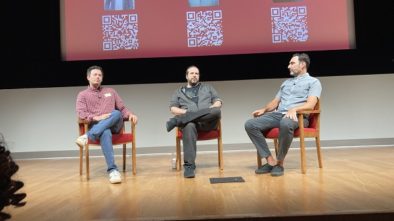Interview with Inderpal Singh Mumick, CEO of Dotgo, a Company That’s Perfecting RCS
Inderpal Singh Mumick, CEO of Dotgo, a business-messaging-solutions company based in Berkeley Heights and Short Hills, is insistent.
“You should get it right away,” he says of Rich Communications Services (RCS) text messages sent from one cellphone to another. “Whether you are on the floor above or sitting across the world in India or London,” it’s a better method of business communications.
Mumick and his team at Dotgo are furthering the development of RCS chatbot messaging. Specifically, they are trying to solve any timing problems in the technology and, perhaps more importantly, to make the messages secure.
Mumick himself is a busy man. While he leads Dotgo, he is also one of the founders and the CEO of Kirusa, an innovative tech-messaging and voice-over-data company that’s also based in Berkeley Heights. On top of that, he is on the board of directors of TechUnited:NJ. Dotgo was acquired by Gupshup, based in Fremont, Calif., in September 2021, but continues to operate in New Jersey.
“RCS is a global standard that’s been developed by a consortium of mobile operators and technology vendors around the globe,” Mumick explained. “We as a company started in New Jersey, building out RCS technology during the pandemic. That’s where we built all of our technology, but we are just a part of the overall RCS technology that’s been built around the world with very major players like Google and Samsung and Orange. All have had significant roles to play, and they’re continuing to have significant roles to play, in building out RCS technologies.”
Most of Dotgo’s RCS contribution was developed by both Mumick and his CTO, Surinder Singh Anand. “We built this technology starting in 2019, and we are still building the technology,” Mumick said. For the duo and the Dotgo team as a whole, this is an ongoing process.
“For example, as a part of building the technology, we have filed certain patents in the space. RCS overall in the industry is a new product. It is the next generation of SMS. It’s starting to get rolled out; it’s been rolled out for the last three to four years, but it’s been more of a testing of small pilots going on. Now it is being rolled out in large numbers.”
According to Mumick, there are well over 200 million RCS users in India, almost 100 million in Brazil and roughly 50 million in Mexico. “And there is somewhere between 30 to 50 million users in the United States today,” he added.
RCS impacts customers in two ways. The first is in person-to-person communications. RCS supports audio, pictures, video, and more for the user. “It really enriches the messaging with media and instantaneous visibility as to what is happening, and it goes over data, so it benefits from all the data elements as well,” Mumick said. “The other way it impacts customers is when they interact with a business,’ Mumick continued.
“Today, when you get an SMS from a business, it comes from a short code, and you don’t really know what business it is. It is some five-digit number or some 800 number that you get an SMS from, and you wonder what it is. Is it real? Is it fake? With RCS, when you get a message from a business, you will see the name of the business, the logo of the business, and you will see a trust mark, a green check mark that you can actually trust this business, that somebody has verified that this is a legitimate business. There is no way for somebody to spoof, it’s not possible. There is security, safety and trust that you build. And you can interact back and forth with your business: You can send messages, they can send messages and it’s a much richer and conversational engagement with the business.”
Currently, RCS can be used on all Android devices, but not yet on iPhones. All that is needed on the Android phone is a Google Messages or Samsung Messages app. The industries that have benefitted the most thus far are telecom, and then retail and e-commerce. “The telecom industry is enabling this and then using this technology for their own communications with their customers,” Mumick said. “So, if T-Mobile or AT&T are sending you SMS, they’ll start sending you messages that are richer, that are more engaging that way. Retail and e-commerce companies are using it for marketing for prepurchase to their users, or actually doing a transaction and making a purchase decision, and post-purchase support for the users. We are expecting it will be huge for the banking and financial sectors as well because of the trust and security factors.”
Dotgo’s Short Hills office has six employees, and the company’s purchase almost a year ago by Gupshup has given it the opportunity to grow globally, having started projects in Europe, India and Africa, in addition to the United States.




